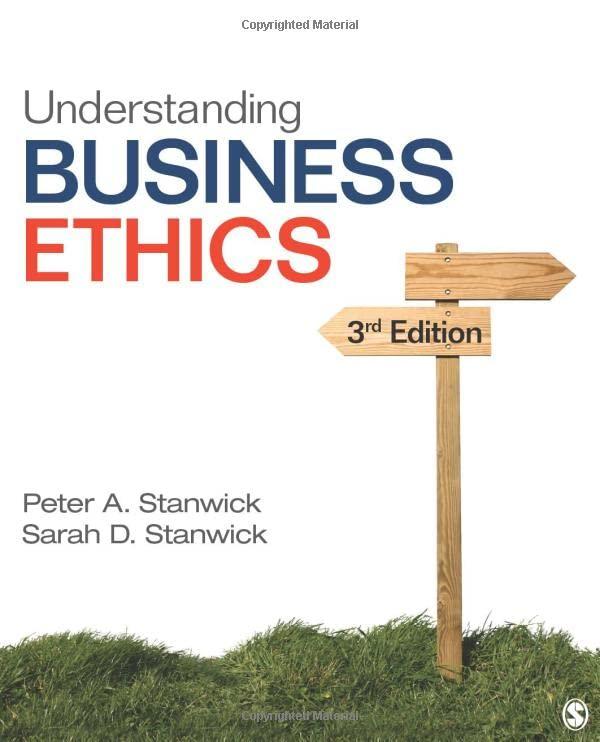Based in Yonkers, New York, Greyston Bakery has been baking brownies since 1982. The company was founded
Question:
Based in Yonkers, New York, Greyston Bakery has been baking brownies since 1982. The company was founded by a Zen Buddhist priest, Bernard Glassman. Glassman was a former aerospace engineer with a PhD in applied mathematics from the University of California who borrowed $300,000 to open a small bakery in the Bronx. Greyston moved to Yonkers in 1985. The original mission of the bakery was to produce highquality products locally made by Glassman’s meditation group that would provide a sustainable living. The mission soon evolved to allow others the same opportunity to provide financial support for themselves.
Greyston Bakery quickly became known as a producer of high-quality brownies sold in some of the top-rated restaurants in New York and in some of the top retailers, including Bloomingdale’s, Saks, and Godiva.1 The mission continued to evolve until the hiring of the workers became as important, if not more so, than the brownies. Greyston Bakery’s current mission statement includes Greyston’s commitment for personal transformation and the ability to contribute to community renewal. This mission is achieved by producing high-quality baked goods with a commitment to customer satisfaction.2 The current vision of Greyston is to be a leading model for other organizations on how to develop a social enterprise that creates a partnership with employees, the community, and Greyston’s shareholders. Greyston hires men and women who have minimal or no work experience. In many cases, they have never had an opportunity to find a job because of homelessness, substance addiction, incarceration, domestic violence, or illiteracy. Greyston enrolls potential employees into a 6-month apprenticeship program where the employees learn technical skills and general business skills, such as appropriate behavior and attitude. The trainees are evaluated every 2 weeks, and one mistake such as being late for work can result in dismissal from the program.3 Greyston is a for-profit company with annual sales of $8 million and 50 employees. All the profits from the bakery go to the Greyston Foundation, which funds various self-sufficiency programs such as housing for the homeless, children’s programs including child care, health and social services, housing for HIV/AIDS individuals, and community gardens.4 In February 2012, Greyston Bakery enrolled as a benefit corporation (B Corp). A B Corp focuses on financial projections, as well as on social and economic goals and objectives.
Greyston Foundation
Greyston is unique in its focus because it uses the skills and rewards of entrepreneurship to address issues related to the inner city. The foundation follows the creed of Greyston, which is “We don’t hire people to make brownies. We make brownies to hire people.” Greyston Foundation programs serve 2,200 community members every year, and it has a budget of $15 million. Greyston Foundation acquires buildings that are renovated and repaired and are offered to people in the local community who would not otherwise have any means of shelter. Greyston has developed real estate with a value of more than $8 million and is currently working on real estate projects that total another $25 million. The housing also incorporates Greyston-focused programs to help individuals both physically and spiritually. The programs are based on the five elements that are the foundation of the Zen philosophy: meditation, study, interfaith expression, work–practice, and social action. The individuals are not required to participate in religious activities, and the programs are designed for both personal and social growth. Glassman believes that breaking the cycle of homelessness is not just giving individuals temporary housing but also giving individuals the skills and confidence they need to be selfsustaining in their lives. The ultimate goal is not just to stabilize and enrich the individual’s life but also to stabilize and enrich the living conditions of the local community.6 Greyston Foundation also focuses on a holistic approach to addressing the needs of HIV/AIDS individuals.
Housing is offered to these individuals, as are specially designed health care programs addressing the unique needs of these individuals.7 Greyston Foundation developed training and job skills programs to successfully transfer “hard to employ” into easy to employ. The training programs are not solely designed to fill positions at the bakery but also focus on the development of general skills so the individual can also apply for employment at different businesses.
Greyston Foundation also supports high-quality child and youth services for low-income people in the local community. The programs facilitate the development of the children and give the parents an opportunity to seek employment and to become financially self-sufficient.
The Mistake That Saved the Business
In 1988, Ben & Jerry’s Ice Cream contacted Greyston, wanting Greyston to produce a thin brownie piece that would be part of an ice cream sandwich. The first batch of extra thin brownies that arrived at Ben & Jerry’s was a disaster. The brownies stuck together and created a 50-pound block of brownies. The brownies could not be used to make ice cream sandwiches, but Ben Cohen decided Ben & Jerry’s needed to do something with the purchased materials. Ben & Jerry’s realized that small chunks of brownies could be easily taken from the block and included in chocolate ice cream. Chocolate Fudge Brownie Ice Cream was born. Greyston also supplies the brownies for Ben & Jerry’s Dave Matthew’s Magic Brownies, Half-Baked, and Neapolitan Dynamite ice cream flavors. Greyston makes 11,000 pounds of brownies a day for Ben & Jerry’s, which constitutes 90% of Greyston’s daily production......
Questions
1. The new CEO appears to have much more corporate business experience than the previous CEO. Should this be a concern for the corporation?
2. In your opinion, why has Greyston Bakery been so successful?
3. Comment on the social activism of Greyston Bakery. Why don’t more companies follow suit?
4. Is it possible to continue making a profit while trying to transform employees’ lives? Explain your position.
Step by Step Answer:

Understanding Business Ethics
ISBN: 9781506303239
3rd Edition
Authors: Peter A. Stanwick, Sarah D. Stanwick





